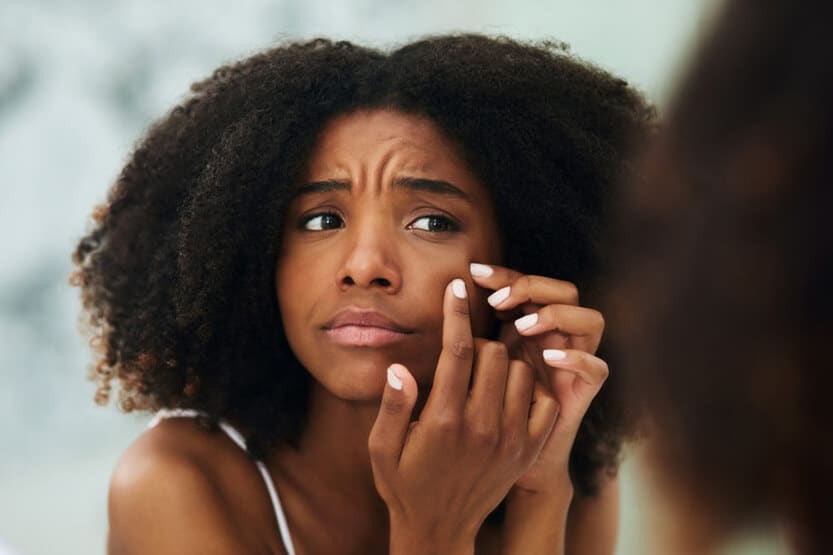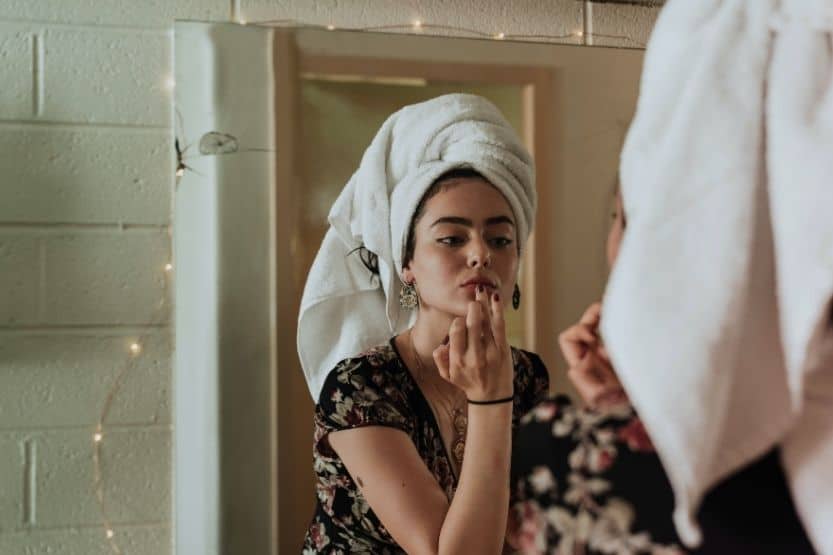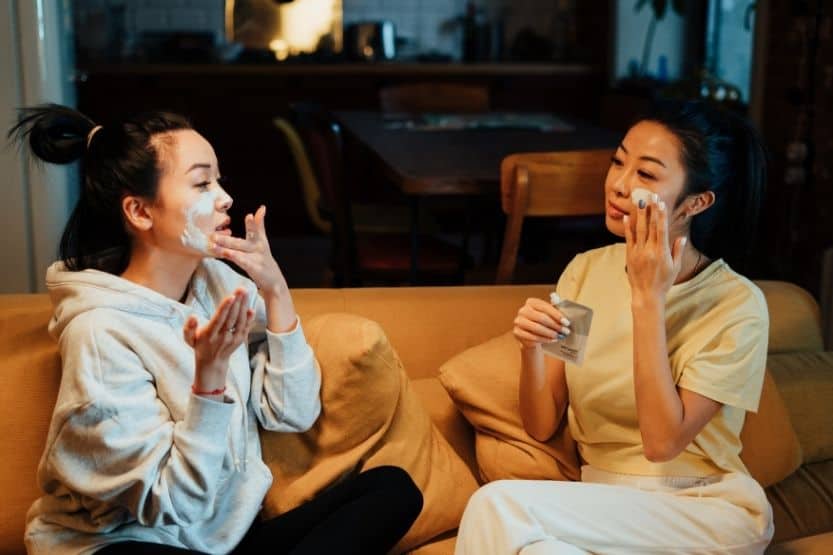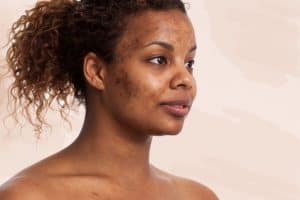When a pimple is popped, normally, a soft fluid comes out. Sometimes, however, a hard substance comes out of a pimple. What is this hard thing that came out of the pimple?
The hard substance that comes out when you pop a pimple is dried dead skin cells and dead white blood cells. Normally, a soft fluid comes out when the pimple is popped, but it will be a harder substance if the substance is dried.
Pimples such as whiteheads, pustules, and blackheads can be popped, but they should be done properly. Your skin will be infected if you pop a pimple incorrectly. It may even lead to scars. You should never try to pop solid red bumps beneath your skin.
The hard red bumps on your skin are called papules. Sometimes they are painful to the touch. A pimple with a hard white seed at its center is called pustules. It is also called zit. The substance that you pop out of pustules contains dead white blood cells.
Read on to learn more about this hard thing that came out of your pimple, as well as tips for popping pimples safely.
Also, for easy extraction of blackheads, take a look at the product below. This tool is a safe and effective method of extracting blackheads, popping pimples, and cleaning pores.
Click here to see it on Amazon.
I Popped a Pimple and Something Hard Came Out
When a pimple or zit is popped, there is usually liquid pus within the pimple, but sometimes there is a hard substance. The hard substance that comes out when you pop a pimple is dead skin cells and dead white blood cells.
Popping pimples is a universal thing. Nearly all people around the world have, at one time in their lives, popped a pimple, most of them incorrectly. In that sense, popping pimples is not life-threatening. But popping a pimple has unwanted consequences if not done properly.
Yes, you can pop out your pimples, such as whiteheads, pustules, and blackheads. But it would be best if you did it properly, or you stand the risks of spreading the infection and the pimples as well. If the infection gets serious, this may lead to the development of scars.
If the red bumps underneath your skin are painful to the touch and are hard and solid, you should never squeeze them out. These pimples are called papules, and some even think of them as zits.
The substance that comes out of a pimple is pus, which contains dead white blood cells and dead skin cells.

How Does a Pimple Develop?
To be able to know how a pimple develops, you need to understand how your skin works. There are oil glands in your skin pores. At the age of puberty, most people will experience an increase in their androgens, sex hormones.
Due to the presence of excess hormones, your oil glands will become overactive. They will enlarge and generate excess oil, which is called sebum.
The presence of too much sebum will produce dead skin cells, which will block your hair follicles or skin pores. Sebum in excess amounts will also cause bacteria overgrowth called Cutibacteriumacnes.
If your blocked skin pores become inflamed or infected, a pimple develops. This is the red bump that has a white center. The pore will then clog, close, and bulge. You now have a pimple with a hard white core.
When the pore clogs but stays open, and its top becomes blackish in color, you have a blackhead. It turns black because its exposed substance has been oxidized. It is incorrect to think that it was because your skin is dirty.
There are millions of pores in your skin. They are just sitting on your hair follicles. Your skin pores connect your skin surface to the sebaceous gland underneath your skin. This is the gland that generates the sebum, an oily substance.
Small amounts of this substance are constantly being released into the skin and hair follicles. Dead skin cells are also continuously carried by the sebum to wash them away through the outer surface of your skin.
There are times when the sebaceous gland generates an excess amount of sebum. Every time this happens, your skin pores will be clogged with oil. Dead skin cells and excess oil act like plugins in this gland.
Thus, your skin pores will eventually become clogged with oil, sebum, and bacteria. Bacteria always multiply rapidly. Once they grow in numbers, there will be infection, inflammation, or swelling around the clogged pore.
Pus will form as a white tip at the top of the clogged pore. A pimple has now developed on your skin.
Causes of Pimple with a Hard Core or Substance
As mentioned earlier, if you pop a pimple and something hard comes out of it, that hard substance is simply a build-up of dried, dead skin cells. There are several reasons for pimples like this and acne in general.
Acne does not only occur during the teenage years. Other causative factors bring about the development of pimples. They include the following:
- Drug and chemical substances such as isoniazid, corticosteroids, phenytoin, and lithium
- High levels of humidity and sweating
- Greasy lotions, cleansers, cosmetics, and certain clothing
- Hormonal changes connected to menstrual cycles, birth control, hormone therapy, birth control, and pregnancy
- Genetics or people who are naturally susceptible to having pimples
Some myths purport to explain the causes of pimples. You need to understand these myths so that you won’t get unnecessarily worried about them.
- Oily diets
- Eating too many nuts, greasy foods, chocolates
- Infrequent washing of face and poor hygiene
Most pimples are blackheads and whiteheads. Although they commonly develop in those who are in their puberty, they can still develop in anybody no matter what their age is.
The development of pimples is also associated with hormonal changes. The most commonly develop on the face, back, neck, chest, and shoulders.
How to Get Rid of a Pimple?
Pimples are no longer a difficult problem to solve if you don’t preoccupy your mind too much with them. It is in too much worrying about the pimple that it seems to get worse. There are, however, some things you can do to get rid of pimples – even the pimples with hard substances or inner cores.
1. DIY Home Remedies
If you don’t want your pimples to get worse, follow these remedies. These remedies are also good for those with cystic acne.

- Refrain from applying heavy makeup on your face.
- If you need to wear makeup, use those that are water-based, and non-oily and non-comedogenic formulations.
- Remove your makeup before going to bed.
- Wash and clean your face before you go to bed.
- Don’t scrub your face harshly when washing. Avoid soaps and face cleaners abrasive and those containing granules, astringents, and exfoliating substances.
- Use mild soap and lukewarm water to wash your face.
- Don’t wash your face too often. Most should be twice a day.
2. Common Treatments for Pimples
If home remedies are not enough and the pimples persist, you can try the following common treatments. The treatment option should correspond to the degree of your skin problem.
Oral Antibiotic
A doctor or dermatologist usually prescribes this treatment. It is recommended for those who have several cysts or pustules on their faces and upper bodies. The doctor can also inject anti-inflammatory medications to decrease the size of the pimples.
Clascoterone (Winlevi)
Clascoteone is a topical cream that is applied twice daily. It is an anti-inflammatory medication that will also block androgen hormones. This is safe because the FDA approves it for both girls and boys from age 12 and up.
Benzoyl peroxide
This substance has antiseptic properties and can reduce oil production. It can cause your skin to be flaky and dry, so use this according to your doctor’s prescription.
It can bleach out your clothing, bedsheets, and towels, so be careful. This medication is usually applied to the face before you go to bed.
Isotretinoin
This is a prescription medication taken orally to control severe acne. If you have big cysts on your face, neck, and upper chest, this medication is recommended.
Spironolactone
This is a hormone blocker that is prescribed for teenage girls fighting acne.
Antibiotics
This is a medication recommended for those with persistent acne, taken either orally or topically. Some antibiotics contain anti-inflammatory and anti-bacterial components. They are typically prescribed for short-term use, e.g., a couple of months only.
Sulfur and Resorcinol
These include prescription antibiotics and prescription retinoids that are applied to the skin. They can reduce inflamed pustules, whiteheads, and blackheads.
Oral Contraceptives
These medications can also be used to control acne since it is directly linked to hormonal changes. However, not all contraceptives are effective. Some may even make the problem worse.
So to answer the common question, “I popped a pimple and something hard came out,” it is simply dried, dead skin. The hard stuff that comes out of a pimple if you pop it out is dead white blood cells and dead skin cells. It is possible to squeeze out pimples such as whiteheads, pustules, and blackheads, but you should do it properly.
Now, let’s look at how to prevent pimples from forming.
How to Prevent the Development of Pimples?
While a pimple’s real cause cannot be specifically pinpointed, there are many ways to prevent its onset. Follow the steps below to avoid breaking out with pimples:
1. Wash Your Face Properly
If a hard substance came out of a pimple, this is an indication that you need to clean your face from dirt, sweat, and oil. But I don’t recommend you do this more than twice a day. To properly wash your face, follow these steps:
- Use warm water, not cold water, in washing your face
- Gently apply mild cleanser in circular motions with your fingers and not a washcloth.
- Rinse your face thoroughly and pat dry.
2. Know Your Skin Type
It doesn’t matter whether you have normal or oily skin. You can still get pimples. Your skin is producing too much sebaceous oil, that’s why. Those with combination skin with skin areas that are both oily and dry are also susceptible to pimples.
The oily areas of the skin are usually located in the chin, forehead, and nose. These areas in your face are called the T-zone. If you know your skin type, you will select the right facial skincare products to buy.
For instance, choose non-comedogenic products if your skin is oily so that your skin pores won’t get clogged.
3. Moisturize Your Skin
Keep your skin always hydrated by moisturizing it. But be careful in choosing the moisturizer that you will use. It must not contain synthetic fragrances, oil, and other substances that irritate the skin.

The best are moisturizers that are non-comedogenic and fragrance-free. Apply moisturizer on your skin after you have cleaned and washed your face and patted it dry.
4. Use Over-the-Counter Acne Treatments
You can also control and prevent the onset of hard pimples if you use over-the-counter acne medication. Most of them contain sulfur, salicylic acid, or benzoyl peroxide. Use it to treat pimples or as a regular maintenance ritual to prevent the “something hard came out of pimple” scenario.
Sometimes side effects such as redness, dryness, or irritation of the skin may result. This will only happen if you don’t carefully follow the instructions on the bottle. So, to avoid these side effects, carefully read the instructions before applying the treatment.
5. Stay Hydrated
Your skin will be prone to infections such as pimples and rushes if it is not well-hydrated. If your skin is dehydrated, your bodily system may signal your skin’s oil glands to produce additional oil. Skin that is not well hydrated looks dull as well.
To properly hydrate your skin, you should drink at least 8 glasses of water every day. If you’re working out daily, you should drink more. You should also do the same if you’re in a hot environment or pregnant, or breastfeeding.
One of the best methods to avoid pimples with hard white cores is to stay fully hydrated.
6. Limit Your Makeup
Control the amount of makeup that you put on your face, especially those you use to cover your pimples. You are plugging your skin pores even more, causing your problem to get worse. If at all possible, go au natural.
If you really need to wear makeup, use non-greasy and fragrance-free products. Your foundation should be light as well. This will prevent breakouts.
7. Avoid Touching Your Face
If you are coming from outside, your hands will surely be full of dirt and germs. Touching your face with unclean hands will surely encourage the growth of harmful germs on its surface. Break this habit if you want to prevent breakouts.
8. Avoid Too Much Sun Exposure
The best way to dry out your skin is to expose it to the sun’s UV rays frequently during the day. You don’t want that, so don’t expose your skin to the sun more than you need to.
Overexposure will induce the overproduction of oil in your glands and encourage the clogging of your skin pores.
9. Break the Habit of Popping Your Pimples
It is very tempting to pop your pimples, especially if you think that this is the best way to erase them from your face. On the contrary, it will result in more breakouts on your face. Popping pimples usually cause bleeding. Bleeding often causes infection and so forth.
10. Don’t Eat Foods That Encourage Pimples
A study conducted in 2010 revealed that your chances of getting acne are very high if you eat a high glycemic diet. Baked goods made of white flour, soft drinks, and chips are high in sugar.
Aside from causing pimples, they are not nutritional. Eating too much dairy products also triggers pimples.
11. Reduce Stress
While stress does not directly cause pimples, it may make them worse.
Research conducted by The American Academy of Dermatology revealed that stress can cause an increase in the production of hormones that produce oil, which you now know blocks your skin pores. Avoiding stress, therefore, helps to keep pimples at bay.
Conclusion: Popped a Pimple and Something Hard Came Out
The hard stuff that comes out of a pimple if you pop it out is dead white blood cells and dead skin cells. It is possible to squeeze out pimples such as whiteheads, pustules, and blackheads, but you should do it properly.
If you pop out a pimple carelessly, your skin will be infected. It may even develop into scars later. Hard and solid red bumps beneath your skin should never be popped out.
Related reading:
Bleeding Pore on Nose [11 Possible Causes and Treatments]
Hole in Nose After Removing Blackhead – How to Minimize
Extremely Large Pores: Causes & How to Minimize






